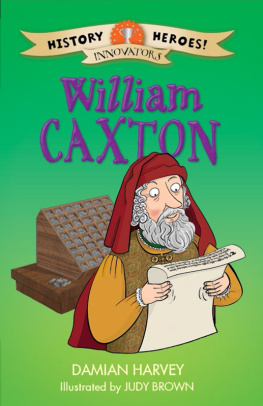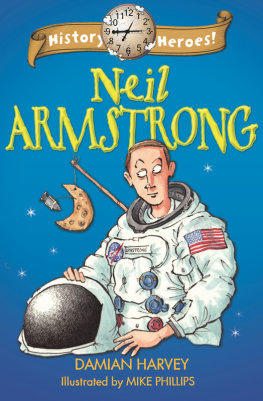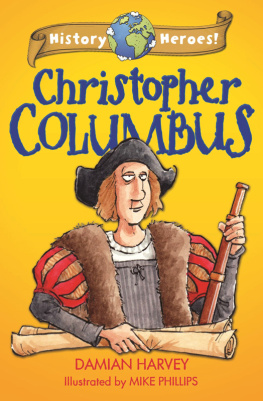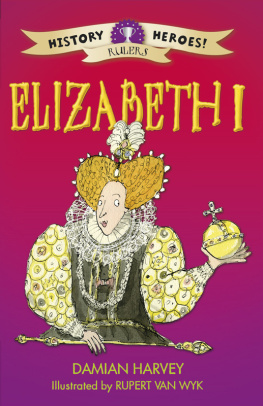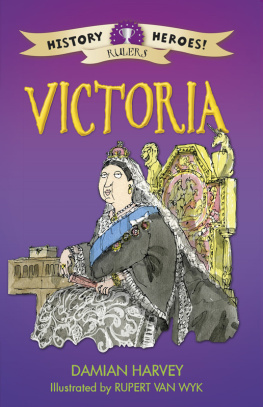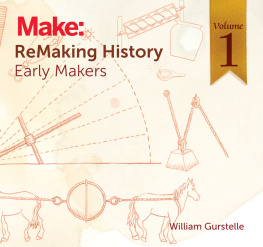
www.franklinwatts.co.uk

CHAPTER 1
An Apprentice
When William Caxton was born in England in 1422, the world was very different to the one that you and I know today.
There was no television, there were no video games and no computers. There werent even many books.

As soon as William was old enough, his parents sent him to school.
This meant that he was able to learn to read and write, something that a lot of people couldnt do. He was very lucky.
William had to learn French and Latin because there werent many books written in English.

When he was 15 years old, William left his family home in Kent and travelled to London.
Life was very different in London. It was busy and exciting.

He became an apprentice to a wealthy merchant named Robert Large. He lived in Robert Larges house and ate his meals there too.
Robert Large was a mercer, a merchant that specialised in buying and selling fine silk, linen and velvet cloth. William learnt all about the cloth business and trading with other countries. William was lucky to have such a good job.

In 1430, Robert Large became Sheriff of London. Then, in 1439, he became Lord Mayor. He was a very important man in London.
When Robert Large died he left William some money in his will. It was just enough for William to set up his own business.

CHAPTER 2
Off to Belgium
William packed his things and boarded a ship for Belgium. There, he made his way to the city of Bruges, the centre of the wool trade in Europe, and set up his own cloth merchant business.
He was a successful businessman and soon became Governor of the English Nation of Merchant Adventurers at Bruges. He helped protect the business of other English merchants abroad in Europe. He also worked as an ambassador for King Edward IV of England.

While working as an ambassador, William gained the trust of the Duke of Burgundy, known as Charles the Bold. Charles married Margaret, the Duchess of York, King Edward IVs sister, in 1468.
Margaret liked William Caxton and she gave him a job as her personal secretary.

Even though he had a good job, William was still buying and selling furs, spices and other valuable goods. He also noticed that people were interested in some other expensive goods in Brugesbooks.

Most books were written by hand and it could take a scribe years to copy out the text for one single book.
This made books very expensive. Only the richest people could afford them.

At first, most books were created in monasteries. As time went on, many scribes started setting up their own businesses.

Books were becoming big news and quite a few people had started selling them in Europe.
Most books were written in French or Latin. William didnt think that he would be able to make a lot of money selling them in England.
Then he had an idea.

CHAPTER 3
The Printing Press
William set to work translating a popular French book called Recuyell of the Histories of Troy. The book was full of stories of love, war and adventure in the ancient Greek city of Troy.

He spent days, weeks and months translating the book from French into English.

His hands hurt from writing every day. His back ached from leaning over his desk and his eyes became red and sore from staring at the pages for so long.
He was ready to give up, but Margaret, the Duchess of Burgundy, persuaded him to keep going.
When it was finished, the book became very popular in the Dukes royal court and people couldnt wait to read it. They all wanted a copy of the book for themselves, and they wanted it now!

William knew that it would take him the rest of his life to write enough copies of the book, but he had heard there was a faster way of doing it.
Someone in Germany had made a machine that could make books very quickly.

Caxton was determined to find out all about it. He packed his bags and set off for the German city of Cologne.

A few years earlier, a goldsmith named Johannes Gutenberg had been working on something that would completely change the way that books were made in Europe.

Gutenbergs invention used a mixture of old and new technology from around the world. He used paper from China, metal letters cast in Europe, a large wooden screw from German wine presses and ink.
He used his invention to print copies of the Bible in Latin. It proved very popular and people couldnt wait to buy one. But Gutenberg never made much money from his invention.

Next page
